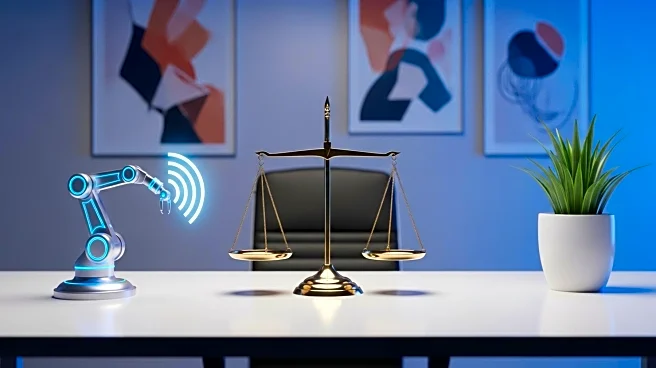What is the story about?
What's Happening?
The advent of the human-machine era is prompting Chief Human Resources Officers (CHROs) to develop AI-focused strategies to remain competitive, according to a recent Gartner report. However, these leaders are facing challenges in cultivating a work culture that supports this transition. Despite the necessity for change, many organizations remain in an experimental phase, with CHROs needing to explore new methods of managing talent and workloads. Gartner's July data indicates that less than half of the surveyed CHROs believe their current culture effectively drives employee performance. The Grossman Group's September report highlights that employees may not be prepared for the extensive changes anticipated in the coming years, emphasizing the need for full employee buy-in to ensure successful implementation.
Why It's Important?
The struggle to adapt work culture for the human-machine era has significant implications for U.S. businesses and their workforce. As AI becomes increasingly integrated into business operations, the ability of CHROs to foster a supportive and engaging work environment is crucial for maintaining productivity and employee satisfaction. Failure to do so could result in decreased performance and higher turnover rates, impacting overall business success. Moreover, the readiness of employees to embrace change is vital for seamless transitions, making it imperative for HR leaders to equip managers with tools to facilitate productive discussions and empower employees to address their own productivity challenges.
What's Next?
CHROs are expected to lead efforts in preparing the workforce for upcoming changes by clarifying expectations for leaders and helping them develop 'change reflexes.' This involves teaching leaders and employees to manage discomfort and adapt to new dynamics. As organizations continue to experiment with AI integration, HR professionals must focus on creating a culture that not only supports technological advancements but also enhances employee engagement and performance. The ongoing development of these strategies will be critical in shaping the future of work in the human-machine era.
Beyond the Headlines
The integration of AI into work culture raises ethical considerations regarding employee privacy and the balance between human and machine roles. As AI systems become more prevalent, organizations must navigate the complexities of ensuring fair treatment and opportunities for employees while leveraging technological efficiencies. This shift also prompts discussions on the long-term impact on job security and the evolution of skill requirements, necessitating continuous learning and adaptation from the workforce.















